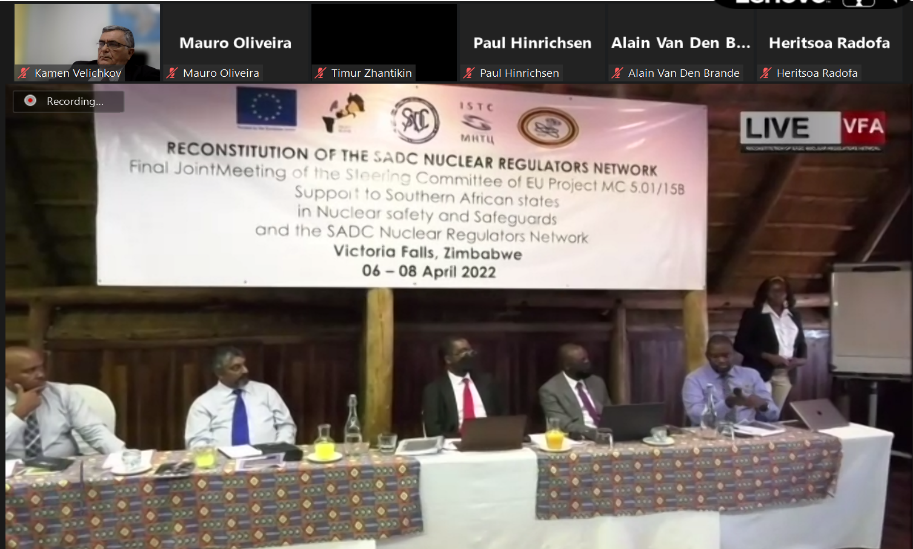Joint meeting of Southern African nuclear regulators for results dissemination of the SADC Project

SADC nuclear regulators from Angola, Lesotho, Malawi, Mozambique, Madagascar, Seychelles, South Africa, Tanzania, Zambia and Zimbabwe got together on 6 April at Victoria Falls, for a three-day Joint Meeting of the Project MC 5.01 15B Steering Committee and Working Group and the SADC Nuclear Regulators Network (NRN). The meeting that marked the tenth anniversary of the NRN sought to recapitulate the regulators’ achievements, and also to take stock of the outputs and outcomes of the EU-funded ISTC – implemented Project Support to Southern African States in Nuclear Safety and Safeguards. It was hosted by the Radiation Protection Authority of Zimbabwe (RPAZ), and was conducted both in-person and online.
The meeting allowed its participants make a recap of the Harare Declaration, review the evolution of the regulatory bodies in SADC in ten years’ retrospective, discuss on cooperation areas and establishment of Technical Working Groups, and decide on the way forward in the regional cooperation.
It also presented and opportunity to survey and analyze the results of the Project MC 5.01/15B, including a regional report on the state of affairs of nuclear safety, security and safeguards, and a recommended Action Plan; inter-regional experience sharing of best practices; national coordination mechanisms for the elaboration of norms and policies; standard rules for safe and secure transport of radioactive material; and an Information Tracking System to monitor cross-boundary movement of yellow cake and sources.
In his welcoming remarks Dr. Justice Chipuru, RPAZ Chief Executive Officer, noted that countries from Southern Africa have benefitted from the Project for the sake of improvement of their nuclear governance, and described the intensified regional interaction as pertinent and timely.
In his remarks ISTC Executive Director David Cleave expressed satisfaction over the fact that all the participating SADC countries benefitted from the project to improve their regulatory legal and normative frameworks and policies for safe and secure transportation of UOC and radioactive sources within and out of the region. Favorable conditions were created so that SADC may provide a platform for nuclear governance synchronization.
Alain van den Brande, Project Manager – EU policies, EC Directorate-General INTPA, greeted the participants in the event and confirmed the intention of the EU Instrument for Nuclear Safety Cooperation to continue as appropriate to develop cooperative initiatives with African partners of which the project is a flagship example He noted that the project has been implemented in an efficient way and was well accepted by the stakeholders.
Participants took note of the fact that the Project proved to be a vehicle for examples of inter-regional exchange of experience in the field of nuclear safety.
Dr. Timur Zhantikin, CEO Kazakh NPP ltd., the Project’s Lead Expert, recalled how Working Group elaborated and reviewed the nine country-specific reports and the regional comparative study that informed the recommendations in the draft Action Plan. He stressed the importance of the harmonization of the regulatory approaches among countries that take part in trans-boundary transport of uranium.
Krister Liljegren, Area Manager at Environics Oy, explained the outcome from the study visit of the African partners to Finland in June 2019, namely: SADC countries declared interest in threat and risk management simulation exercises; developing public awareness strategy, involvement and engagement of key stakeholders appears necessary for successful implementation, and can be done; knowledge creation and sharing important to support law enforcement and other societal actors when need arise.
For pandemic reasons, regrettably, the study visit to Kazakhstan had to be organized through a series of webinars. Professor Dr. Irina Tazhibayeva, Director of Nuclear Technology Safety Center of Kazakhstan, briefed the participants in the meeting about the themes of presentations of leading Kazakh and Armenian experts, ranging from uranium mining methods to nuclear physical security during radioactive material transportation; vulnerability assessment; notification and authorization systems; inspections, etc. The lecture on the Transportation Control Center arouse particular interest.
The afternoon session focused on regional report on the state of affairs of nuclear safety and safeguards in the Southern region of Africa. Melody Nsofwa, Nuclear and Radiation Safety Manager at the Radiation Protection Authority of Zambia, presented the findings and proposals of the Project Working Group that Zambia chaired. The team that authored the Report used an interactive research methodology that based on document analysis, stakeholder meetings and an online survey. The analyses revealed regional gaps and challenges in the domestication and implementation of international legal instruments; in the coordination among various elements of the institutional infrastructures; in some inadequate provisions in the legal frameworks; in the lack of arrangements for transboundary movements for UOC or other RAM.
In turn these conclusions informed the recommendations made in a draft a Regional Action Plan to enhance nuclear safety and security in the SADC region. The Plan should address the priority areas and suggest synchronized actions by the countries of the region, in collaboration with relevant international organizations.

